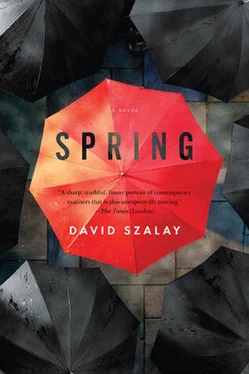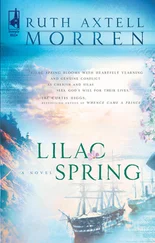James nodded. Shoe was, he thought, quite impressive. He had presence—sitting next to him, Garcia seemed on the point of disappearing. He seemed faint and substanceless, like a film projected in a sunny room.
They were waiting for James to speak.
Though he let them wait for a minute, though he took a slow pull of his Bloody Mary, his mind was made up. They needed money to make their film; that was the purpose of the meeting. That was why Shoe wouldn’t stop smiling, why Garcia was so nervous. James had told him that he had money to invest, which was not strictly true—he would have to mortgage the pizza place.
Shoe sighed and said, ‘We’ve been to every funding body in England.’
‘Yeah?’
‘Yeah.’ He shrugged. ‘You know.’ He was still smiling, wryly now. ‘It just seems nobody wants to help low-budget film-makers, for some unknown reason.’
Garcia said, more or less to himself, ‘No, I know the reason. It involves money. People just don’t want to give money to inexperienced film-makers.’
‘Look, this is a money-making venture we’re in,’ Shoe said, with fresh impetus, looking James in the eye. ‘You know. Film-making. It’s about making a profit, ultimately. We understand that. I don’t think a lot of people in the British film industry understand that. You find this really snooty attitude in the British film industry, that just because we’re not ashamed of wanting to make money, people don’t take us seriously. And then you look at American films, and the success of them.’ He shrugged exasperatedly. ‘You know.’
The film was made for not much more than £20,000. While James wondered where the money went—it did not seem to be up on the screen—Garcia and Shoe showed every sign of being pleased with what they had made; and probably feeling his inexperience, James was inclined, throughout the long and expensive process of post-production, to doubt his own intimations of mediocrity. And he wanted to doubt them. He very much wanted to doubt them.
In May, they took the film to Cannes, hoping to find a distributor there. It was shown twice in the south of France, in a screening room under the monstrous concrete molar of the Palais du Festival. They were not staying in town, in one of the luxury hotels overlooking the sea. Instead they had a mobile home in the Camping Belle Vue, somewhere miles inland. The place had a pre-season feel. The weather was tepid. The swimming pool was still under wraps, and most of the other mobile homes were unoccupied. A few tattooed pensioners in trunks promenaded under the trees, or sat in folding chairs in front of their mobile homes, or watched television inside them.
On their first evening there, James left the silent, frightened Garcia, the sulky Shoe, and went into town on his own. He parked on a meter near the station, and set out on foot for nowhere in particular, except that through some instinct he seemed to be making for the sea. Other than the ubiquitous posters, the only sign of the film festival were some tired-looking men porting video equipment through the streets. It was early evening. As he neared the seafront there were more people in evidence. Most of these people, however, were walking the other way, and when he stepped onto the windy esplanade, under the tall palms and umbrella pines, it seemed to be emptying. The African hawkers were still there with their trays of watches and lighters, but even they were sitting on the lawns under the trees, smoking. Out on the water the yachts and the superyachts, though starting to fade into the smudge of the horizon, had not yet switched on their lights.
In the mothy twilight of the hôtel de plein air, Garcia and Shoe were finishing off a litre of warm vodka, taking the stuff out of mugs, mixed with warm orange juice. Shoe kept slapping his large white legs—he was wearing shorts—as the invisible mosquitoes went for them. ‘What are we doing for dinner?’ he said when he saw James, though he was inspecting his own legs when he said it. ‘I’m starving.’
‘I’ve eaten, mate,’ James said.
‘Oh. Well what about us?’
‘Take the van. Get something. Whatever.’
‘Can’t take the van.’
‘Why not?’
Shoe held up the Smirnoff. ‘I’m too pissed,’ he said.
‘Well… you should have thought of that.’
‘I thought you’d sort something out.’
‘Why?’ James laughed sourly and went inside.
Shoe had turned out to be a lazy prima donna, always whining about something—he had made a fuss about not staying in a proper hotel, for instance—and leaving all the promotional heavy-lifting to James.
No one showed up to the first screening. The slot was a poor one—two o’clock, when everyone was still lingering over liquid lunches or taking siestas in their seafront hotels. Still, it was a sad moment when they told the indifferent projectionist that he might as well take the film off the spools. And while Garcia and Shoe got morosely smashed, slumped in cane chairs in the British Pavilion, James spent the whole afternoon—it was humid and hazy—schmoozing strangers to ensure that the same thing did not happen the next day.
In that, he succeeded. Half a dozen industry types turned up to the second screening, and all left within ten minutes.
So that was that.
Except, for James, there was a postscript.
On their last night one of the Hollywood studios hosted a junket in the Chateau de la Napoule, to which he had managed to wangle spare invites from someone in the British Pavilion. Still locked into his promotional mindset, he moved through the party, sweating in the dinner jacket he had optimistically packed, and trying to set up an interview for ‘the talent’. The place was full of would-be showbiz journalists, with their microphones and hot little lights, and squinting into one of these lights Garcia and Shoe played for the last time at being in the movies. Their interviewer was a young woman dressed for a party, in figure-hugging black with a peach silk rose on her shoulder. She was not English; her voice had a very slight foreign intonation. Probably she was Scandinavian, though she did not look Nordic. She was short, and her hair, except for some silvery threads, was dark and wiry. Her eyes were topaz. ‘And how did you go about getting actors?’ she said.
‘Just rang up agents,’ Eric answered, drunk. ‘Just rang up agents. Spoke to people. Agents…’
She looked uninterested. James had only just managed to persuade her to interview his men, and they were not making a strong impression. Garcia, in particular, was all over the place.
‘And… And what sort of reaction have you had?’ she said, shifting a lock of hair from over her eye.
Standing off to the side, in the shadows, James looked at his polished shoes. There was a pause. He looked up. Julian was smiling steadily. ‘Well, put it this way,’ he said. ‘We’ve had only one person—of all the people who’ve seen this film here—we’ve only had one person who actually hated it.’
The interviewer laughed tactlessly, and James found himself liking her. ‘What did they say?’ she said.
There was another pause.
‘They weren’t very polite,’ Julian said. ‘Let’s just say they weren’t very polite…’
It had been an American, who stood up no more than ten minutes into the second screening and muttered, ‘Thanks for wasting my time.’
To which Shoe, with hurt British fury—‘Thanks for giving us a fair shot.’
‘I have given you a fair shot,’ the American said, making his way noisily to the exit. ‘This is the worst picture I’ve ever seen here. The worst. Saying something.’ Which elicited some nervous laughter from the other members of the audience. The heavy sound-proof door thudded to—and then, following an interval of perhaps a minute, the whole place emptied out.
Читать дальше












